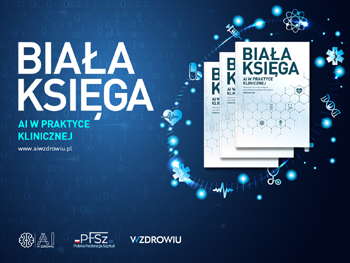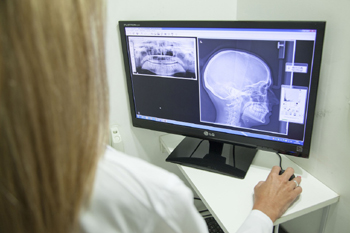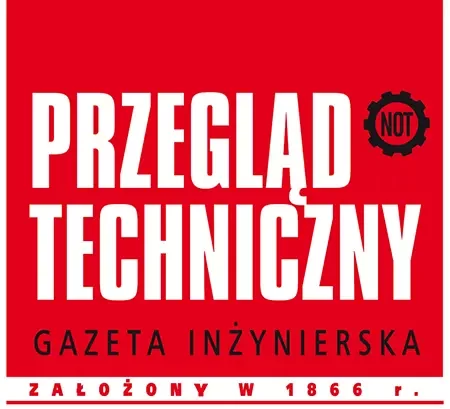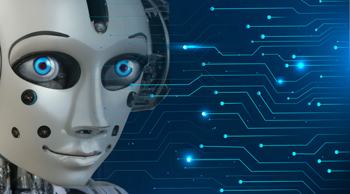Artificial intelligence is currently a hot topic. He appears both as a positive character and a “villain.” Concerns that it will take jobs away from many workers in many manufacturing and service industries are intertwined with reports of how much its use helps us humans. This is also the case with its use in medicine, where it plays an increasingly important role in patient diagnosis or data analysis.
Societies – especially in the West – are aging, and millions of people are suffering from diseases of civilization. This places an increasing burden on health care systems and brings with it the need for faster diagnosis of diseases, for doctors to keep ever more extensive records, but above all for more effective prevention. How to reconcile all these challenges? Taking advantage of the boon that artificial intelligence can be for modern medicine.
Promising prospects
According to Dr. Jaroslaw Kurek head of the Artificial Intelligence Department at the Institute of Technical Informatics at SGGW and owner of Deep Technology, artificial intelligence has the potential to significantly transform the medical sector. Especially in diagnostics. It is already helping to interpret X-ray, MRI or CT images. This facilitates the detection of diseases at an early stage. It allows to identify patterns in medical data that may indicate the risk of developing certain diseases. In addition, AI technologies can analyze complex data from various sources, e.g., genetic, clinical, demographic, lifestyle, to help diagnose diseases. This makes it possible to create more personalized treatment plans. Artificial intelligence, by analyzing vast amounts of data and identifying potential pathways for the development of new therapies, can speed up the process of creating new drugs. Telemedicine using AI, on the other hand, is an opportunity to make remote health care accessible and of better quality.

Nor should we forget about robots in the health care industry. Caregivers can help care for the elderly or sick by performing simple tasks such as administering medication, monitoring health conditions, or assisting with rehabilitation. And surgical ones are already assisting with complex operations, increasing precision and reducing recovery time.
However, there are also challenges associated with artificial intelligence, such as data security issues, ethical aspects of using AI in medicine, and the need to create new regulations, Jaroslaw Kurek noted.
White paper
Is it reasonable to fear that we will be diagnosed not by a doctor, but by artificial intelligence? – The task of AI is not to replace doctors, but to support medical personnel and help them make decisions based on solid data. Doctors will continue to play a key role in interpreting information, establishing relationships with patients and making final therapeutic decisions, responds Karolina Kornowska of the AI in Health Coalition.

The answer to the challenges and dilemmas that may accompany the revolution in Polish medicine related to the use of artificial intelligence is the “White Paper. AI in clinical practice. Applying Artificial Intelligence in the Application of Health Services,” announced in June 2022. It was created by the Polish Federation of Hospitals, the AI in Health Coalition and the AI in Health Working Group. Artificial Intelligence (GRAI). Meanwhile, partners include Microsoft, Medicover, LUXMED Group, Abbot, Comarch Healthcare and IQVIA. – The principles for implementing AI in health care, outlined in the “White Paper,” aim to ensure the safe, ethical and effective use of this technology in medicine, Karolina Kornowska stresses. In total, it’s more than 100 pages of solutions developed by experts on artificial intelligence in medicine. They affect many areas of health care operations, including. such as protecting patient data, ensuring the quality of algorithms, monitoring the effectiveness of AI systems, equality of access and other issues critical to the successful implementation of AI technology in healthcare. The use of AI in health care will require adaptation of the existing legal framework or the introduction of new regulations. According to Karolina Kornowska, legislative action should be based on sound expertise and consultation with various stakeholders to create a legal framework that will enable the development and implementation of AI in medicine in a responsible and beneficial way for patients and society.
The revolution is already underway

It is worth being aware that the use of artificial intelligence in Polish medicine is not a song of the future. This is already happening.
Jaroslaw Kurek gives several examples of its application in practice. Infermedica, a Wroclaw-based company, has developed a system that uses AI to help doctors interpret imaging results. The startup, StethoMe, are using it to analyze breathing and heart sounds to detect diseases. Meanwhile, startup Nucleai is working with several hospitals in Poland to analyze tumor tissue with this technology and help oncologists with diagnosis and treatment planning. MedApp uses AI to monitor the health of patients remotely, while Infermedica offers a medical chatbot to help patients understand their symptoms and decide whether they should seek further medical help. Jaroslaw Kurek’s Deep Technology company, on the other hand, is working on several projects using AI in medicine. One of these is the development of tools for automated segmentation of head tumors. This technology will help radiologists accurately identify and delineate tumor boundaries on medical images, which is crucial for treatment planning and monitoring patient progress. Deep Technology is also working on automatic detection of metastatic nodes using the new LNRADS scale. This will help in assessing the stage of the cancer and planning treatment. Automating this process with AI can contribute to greater precision and efficiency. The company – in cooperation with Warsaw Medical University – is developing a project for a system to automatically detect pathological changes in the liver based on computed tomography and magnetic resonance imaging (MRI). This will speed up the diagnosis of patients with diseases of this organ.
Among the projects using AI to predict the development of diseases and help treat them can also be mentioned – operating at the Medical University of Lodz, the Health Discoverer Platform system, developed by Polish researchers, determines the risk of atrial fibrillation or ischemic heart disease, for example. It uses among others. neural networks and algorithms to create models that predict and classify which patients are most at risk. – Based on the description of medical history, placed in the software’s memory, and test results, the system calculates the risk of heart disease symptoms. By hinting, it allows for faster diagnosis and effective treatments, says Dr. n.med. Bartlomiej Grobelski, director of the Center for Innovation and Technology Transfer at the Medical University of Lodz.
Karolina Kornowska adds Smarter Diagnostics to this list. Its AI-based solutions streamline the work of radiologists by analyzing MRI images. Specialized software reduces radiological reporting time, provides a second opinion and introduces objective evaluation. By using this technology during routine examinations, it is possible to increase the detection of accidental injuries and ensure that injury prevention is improved.
How to overcome barriers to AI development
Not to be too rosy. This is just the beginning of the road for AI to truly revolutionize health care. And there are a lot of barriers on this road. Karolina Kornowska believes that one of the main ones is the lack of access to medical data. They are often scattered across different systems, making them difficult to integrate and analyze. In her view, greater acceptance and trust from medical personnel, patients and the public in AI is needed to overcome this obstacle. Understanding the benefits, educating people about them and explaining how AI systems work can help.
This opinion is confirmed by Jaroslaw Kurek. – Today, many teams do not yet see the value in the datasets they have. As a result, they are scattered on different equipment within treatment units. The approach to conducting research using data generated on the hospital side must change. They contain rules that just need to be discovered and can contribute to the cure of more patients, he argues. And he adds that standardization of data is also needed (the lack of it makes training and implementation of AI algorithms more difficult).
In order to use AI in medicine fully and for the benefit of patients, it is necessary, according to Jaroslaw Kurek, to implement strict privacy and security requirements, regulate such ethical issues as fairness, accountability and transparency in the application of artificial intelligence. And last but not least: doctors and other health care professionals must be properly trained in the use of artificial intelligence. Patient education should also not be neglected, as awareness of the benefits of the technology will help increase confidence in it.
We are at the beginning of the road

Bartholomew Grobelski, stresses that in the case of a limited number of specialists – as is the case not only in our country, some of the tasks facing the health service could be performed especially in the form of support by artificial intelligence. The results of the algorithm can always be subjected to additional verification. However, a properly created artificial intelligence model has a certain level of decision-making efficiency. – The danger, as with any new technology, is fear of the unknown and widespread lack of acceptance. Although both the specialist and artificial intelligence operate on facts and rules, we trust the specialist, the AI is still an unknown. We may need years before we trust the machine – Bartholomew Grobelski believes. He adds that semi-automated diagnostics is the direction the world is currently heading. We are in the same place as the level of Internet use in the early 1990s. No one imagined being able to freely buy things online or make electronic payments. Today, this is already standard.
The role of artificial intelligence in Polish health care is becoming increasingly significant, but it is still only the beginning of the road. Will AI replace doctors?
Lidia Sosnowska





